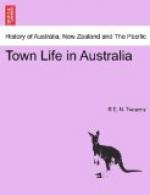Although Western Australia occupies a third of the total area of the continent, it has so little connection with the sister colonies that it can hardly claim to be considered as a factor in Australian politics. The colony was founded in 1829, under the name of the Swan River Settlement, by a number of gentlemen, many of them retired officers, to whom the Imperial Government gave far larger land grants than they had capital to manage. For twenty years both settlement and settlers had to struggle for bare existence, until in 1851 they persuaded the Home authorities to establish a convict station there. This supplied much-needed labour for public works and a market for the stock and produce of the settlers, while the maintenance of the convicts necessitated the expenditure of L80,000 to L90,000 a year of Imperial money in the colony. With these aids, the settlers kept their heads above water, till, owing to the Victorian outcry against what was termed ‘a blot’ on the already rather shady ’escutcheon ’of Australia, the immigration was stopped in 1868. Since then the convicts have dwindled down from 5,000 to 500. Happily the discovery of new pastoral lands occurred almost simultaneously with the cessation of convict immigration, and the colony has slowly but gradually progressed, until now it has a population of 30,000 inhabitants. During the past year exploration has been vigorously prosecuted. Large tracts of country have been taken up for pastoral purposes by capitalists in the other colonies, and several projects for the construction of railways, to be paid for by grants of land, are now under consideration by the Government. At the present moment nothing but capital and population of a more energetic kind than the old settlers seems to be wanting for Western Australia to become a prosperous colony; and provided he is not afraid to rough it, there is no part of Australia in which a capitalist—whether large or small—can more remuneratively settle than in this out of the way part of the world; and this I say after having myself temporarily lost heavily there. Capital is the great need of Western Australia. At present, you feel yourself more out of the world in Perth than in Siberia. The people are poor, old-fashioned, warm-hearted, and slow-going, with no belief in the resources of their own country. Whatever wealth is made there, is made by outsiders—mostly Victorians—who are gradually galvanizing the place into life. But that Western Australia is destined to become a great country, no one who has lived there long enough to know something of it, and not long enough to become impregnated with the prevailing indifferentism, can doubt.




